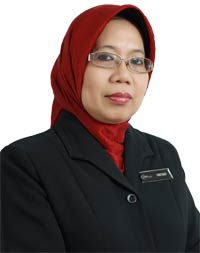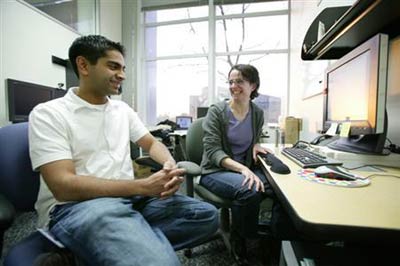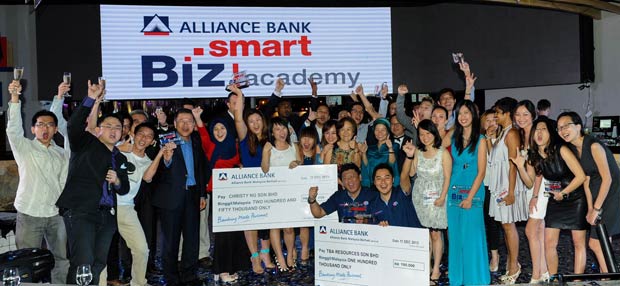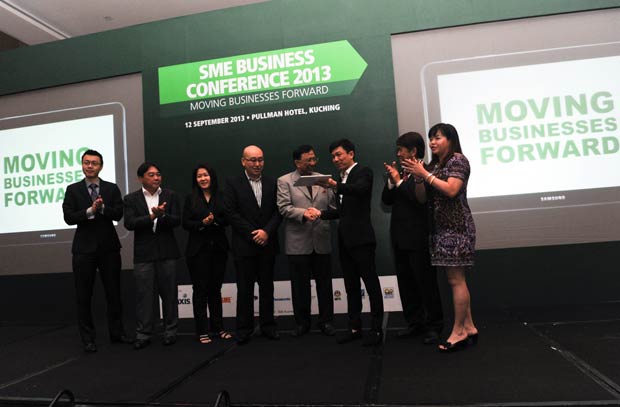by Sharon Kong bizhive@theborneopost.com
Posted on April 19, 2014, Saturday
Datuk Hafsah Hashim
KUCHING: The growth story of small and medium enterprises (SMEs) in Sarawak is one that is still in the works.
SMEs in Malaysia are reported to be on track to contribute 41 per cent to the country’s gross domestic product (GDP) by 2020 compared to 32 per cent in 2012.
Some 50,000 SMEs nationwide have received a total allocation of RM23 billion over the last 20 years through three Ministry of International Trade and Industry (Miti) agencies – SME Corp Malaysia (SME Corp), Malaysian Industrial Development Finance Malaysia Bhd (MIDF) and SME Bank – to develop their businesses.
According to SME Corp chief executive officer Datuk Hafsah Hashim, out of the total business establishments in Malaysia, 98.5 per cent are SMEs.
In Sarawak alone, it was indicated in a National Economic Census by the Department of Statistics that the state had a total of 43,830 or 6.8 per cent SME establishments.
At that time, Sarawak was notably positioned as the state with the fifth highest number of SME establishments in Malaysia.
This comes as no surprise in view of the ongoing Sarawak Corridor of Renewable Energy (SCORE) project which requires a host of SMEs to support that growth and the larger industries in the state.
Sarawak Industrial Development Minister Datuk Amar Awang Tengah Ali Hassan said to date, 18 projects involving RM29.43 billion in investments had been approved under SCORE.
“Fifteen are located in Samalaju in Bintulu, two in Tanjung Manis and one here (Mukah).
“They offer tremendous opportunities for the SME entrepreneurs in food catering, maintenance business, logistics and transportation and other supporting industries,” Awang Tengah said.
More to gain
With various institutions providing support to SMEs, Awang Tengah urged SMEs in the state to make full use of the many programmes and assistance provided to expand their business both locally and outside the state.
On a side note, Sarawak’s SMEs and the rest of the country are set to benefit from Miti’s allocation of RM2 million this year to enhance the competitiveness of Bumiputera SMEs in the manufacturing and services sectors.
Miti Deputy Minister Datuk Hamim Samuri said earlier this month that the allocation will be channelled through Sirim Bhd to help the SMEs through design, management and process innovations.
“To date, 20 SMEs with good growth potential have been identified, and we will approach them to identify which areas of their business can be improved,” he told Bernama, adding that RM40,000 has so far been spent on seminars for SMEs involved, which are in the oil and gas, electrical and electronic, and automotive sectors.
These enterprises have much to take advantage of in terms of the wide variety of initiatives offered across the board by different types of associations.
Banks in particular are stepping up their financing for SMEs and coporate banking.
This is further aided by the growing presence of banks in the state such as Alliance Bank and EXIM Bank which opened up branches here within the past year.
‘Tech-ing’ things up a notch
Technology-wise, SMEs in Sarawak can also benefit from the mobile application (apps) platform which will be created by Technology Park Malaysia, in collaboration with SME Cloud Sdn Bhd.
According to Datuk Dr Abu Bakar Mohamad Diah, Deputy Minister of Science, Technology and Innovation, through the ‘SMEAPPZ.COM’ apps, the public could get detailed information about products by typing the brand name in their smartphones.
Abu Bakar said the initiative was in line with the increasing trend in today’s society on the use of advanced technology and the Internet.
Despite the positive performance of SMEs in recent years, Malaysian SMEs have a lot of catching up to do if they want to be on par with their counterparts in other advanced and high-to-middle income countries, where SME contribution to GDP are much higher, at above 40 per cent share.
This is where initiatives under the SME Masterplan 2012-2020 are expected to unleash the untapped potential of SMEs and enhance the overall productivity and competitiveness of SMEs.
In line with supporting SME businesses in Sarawak and Malaysia overall, BizHive Weekly takes a detailed look at how certain institutions and associations go about this with their respective initiatives.
CGC tailors initiatives to assist SMEs
An organisation keen on assisting SMEs nationwide is Credit Guarantee Corporation Malaysia Bhd (CGC) which believes SMEs in Sarawak have shown positive development over the years.
CGC, the leading credit guarantee provider in the country, generally assists SMEs, especially those with no collateral, insufficient collaterals and do not have any track record, to gain access to financing by providing credit guarantees on those facilities.
It has a total of 16 branches nationwide, of which Sarawak has two in Kuching and Miri for better SME outreach.
In an email interview with BizHive Weekly, president and chief executive officer Datuk Wan Azhar Wan Ahmad highlighted that the small businesses to medium or large scale enterprises have embraced Internet technologies readily and are fully utilising them to their advantage to build on their businesses.
“The outlook for SMEs looks promising with the strong economic structure in Sarawak namely exports, manufacturing medium and high tech industries and SCORE driving growth and providing greater business opportunities for the SMEs,” he projected.
In terms of how CGC has played its part in supporting the needs of SMEs in Sarawak and the rest of the country, he explained that over the years, the group has been consistent in tailoring new initiatives to assist SMEs throughout Malaysia where enhancing access to financing is concerned.
Although Malaysia has constantly been ranked high in the world in terms of ease of obtaining financing, Wan Azhar said access to financing especially those with less than three years in operations due to insufficient collaterals and track records remain one of the pressing issues of the SMEs in general.
“Some of these initiatives that CGC has concertedly embarked on with the financial institutions include the Portfolio Guarantee, an innovative financing scheme that provides for speedier processing and approval of loans to enable customers to have quicker access to the much needed funds,” he shared with BizHive Weekly.
Other initiatives undertaken by CGC for SMEs in Sarawak include the Entrepreneur Clinics which are conducted on a monthly basis as well as the Pocket Talk in collaboration with SME Corp and Unit Peneraju Agenda Bumiputera (TERAJU).
“Pocket Talk is a briefing session which provides an avenue for CGC to create better awareness of its products and services to the SMEs,” Wan Azhar explained.
In addition, CGC has also organised product briefings and meetings with local business chambers such as Dayak Chamber Commerce & Industry (DCCI), Dewan Usahawan Bumiputera Sarawak (DUBS), Kuching Chinese Chamber (KCCC) and Sarawak Manufacturers’ Association (SMA) on a regular basis to reach out to the potentially viable SMEs and create increased awareness of its role in powering Malaysian SMEs.
“Moving forward, CGC will continue to collaborate with other business chambers and trade associations, particularly in Sarawak,” he assured.
On how CGC distinguishes itself from other institutions when it comes to supporting the ambitions of SMEs, Wan Azhar answered that the group supports viable SMEs by acting as a bridge between them and the financial institutions through their guarantee mechanism.
“The guarantee mechanism enhances the comfort of the financial institutions to lend to viable business as it is recognised somewhat as a collateral towards the loan granted,” he explained.
He added that schemes are designed for all SMEs in the country, giving an example of a specific scheme CGC introduced called Enhancer Bumi, aimed at further enhancing the viability of Bumiputera SMEs.
The Enhancer Bumi offers higher guarantee cover and lower guarantee fees to enable more Bumiputera SMEs to have easier access to financing.
In addition to that, CGC also offers the Bumiputera Entreprenuers Project Fund or Tabung Projek Usahawan Bumiputera (TPUB-i) a contract financing scheme to cater to the SMEs that have been awarded contracts by Government-linked companies and agencies.
“CGC views these schemes as particularly strategic and important growth for the Sarawak economy since the state has a much larger pool of Bumiputera SMEs,” he stated.
Besides these schemes, Wan Azhar highlighted that CGC also offers Enhancer Excel which is a full guarantee scheme targeted for businesses that are at least one year in operation.
“Access to financing to this segment of borrowers is important because not all financial institutions have the risk appetite for new businesses since track records as well as viability is not yet firmly established,” he explained.
To assist SMEs to cope with the escalating cost of doing business, CGC had also introduced the rebate mechanism in January this year which provides for a reduction of a certain percentage of guarantee fee for customers with good credit records.
“Customers are able to benefit from the rebate mechanism if they have good credit track record with CGC, and the loan guarantee is active for a minimum of one and a half years.
“This initiative is also aimed at inculcating a sound credit culture among the SMEs in the longer term,” he added.
Aside from the aforementioned schemes, CGC had also established the Credit Bureau Malaysia (CBM), the premier provider of comprehensive and reliable information rating in Malaysia.
This was established to assist SMEs to improve on their credibility and bankability.
CBM can assist SME lending from three perspectives, with the first being that lenders will benefit in terms of enhanced process efficiency and cost savings by using CBM’s ‘one-stop’ source platform for all relevant SME information.
“This translates to lower cost of loan processing and faster approvals for SME borrowers,” Wan Azhar explained.
Secondly, CBM provides a highly robust and predictive SME rating that may be utilized to complement lenders’ internal rating systems. This enables lenders to strengthen their credit risk management for the SME segment and price the SME loans competitively.
Finally, lenders can also leverage on the appropriate tools from CBM to introduce risk-based pricing elements in their SME loan products, whereby creditworthy SMEs will enjoy lower cost of borrowing and continued access to credit.
Overall, in 2013, CGC provided RM1.5 billion of financing benefiting about 2,300 SMEs in all sectors.
To date, the group has guaranteed up to RM296 million of loans to assist viable SMEs in Sarawak to obtain financing for their business.
CGC has targeted to provide RM2.7 billion of financing to benefit about 5,600 SMEs in 2014, with Wan Azhar highlighting the group’s main focus areas for this year.
The first focus is on start-up businesses which are aiming to be ‘The Agency’ for this segment. These comprise of businesses in operation for less than three years and have many challenges to obtain financial assistance from financial institutions (FIs) because of the lack of confidence amongst the FIs.
“Financial institutions still consider start-ups as a risky business because they are new and most start-up businesses are not able to provide the necessary collaterals to the financial institutions,” he explained.
In addition, CGC aims to focus on supporting high growth sectors in conjunction with Visit Malaysia Year 2014 whereby sectors such as transport, communications, hospitality, restaurants and other services are projected to register tremendous growth this year in conjunction with Visit Malaysia Year 2014. These are the sectors that CGC will focus on to spur further economic growth.
Aside from high growth areas, CGC will focus on development of new growth sectors. The group will also continue supporting SMEs in new growth sectors with huge potential such as green technology and oil and gas and others.
Last but not least is the introduction of Syariah-compliant schemes whereby CGC shall also focus on offering Syariah-compliant schemes not only to provide wider financing options but also alternate access to financing for the SMEs.
“In this direction, CGC has partnered with several Islamic financial institutions that offers Syariah-based financing alternatives to SMEs,” Wan Azhar concluded.
Alliance Bank pushing boundaries via BizSmart Academy, SME Innovation Challenge
Alliance Bank Malaysia Bhd (Alliance Bank), known for its dedication to helping SMEs in every way possible, did not disappoint when it launched its SME Innovation Challenge 2013 last year in conjunction with the introduction of the Alliance Bank BizSmart Academy.
With the BizSmart Academy, Steve Miller, head of group business banking in Alliance Bank, shared with BizHive Weekly interview that the whole idea behind it is how they can as a bank, help SME owners run their business smarter.
“There are a lot of different facets to it. There’s an online portal which gets you access to information and maybe some thought-leadership techniques from either locally, in the region or of global things that SMEs have in common,” Miller explained, adding that they launched a new internet platform a few years back which is very focused on small businesses.
“The idea is give big business tools to small businesses for low cost,” he emphasised.
Overall, Miller believes that Alliance Bank has really pushed the envelope in terms of what they offer to SMEs with the aforementioned internet platform being a good example.
“Most banks put their SMEs on their consumer platform so it’s very restrictive. It’s the same thing you and I would use to pay our bills and operate our accounts.
“We decided that especially for our sole proprietors and our small SMEs, that we wanted to give them the same platform that we give to our big listed corporates.
“We knew that they wouldn’t use all the tools necessarily but someday they will and someday, they’re going to need it,” he explained.
Miller emphasised that the bank does not need them to start on one platform and switch later as Alliance Bank just wants to give SMEs access to that system so that when they’re ready to use it, they can use it.
“There’s no change or anything else so it’s very flexible for them. Not a lot of banks would do that. That was the big thing we really wanted to push.
“I think thats the big differentiator,” he shared with BizHive Weekly.
On the SME Innovation Challenge, Miller explained that the idea was really to go after the younger entrepreneurs – people who have been in business for less than three years – and put them into a competition where they selected participants out of a couple hundreds of entrants.
“Out of those entrants, we selected a final group of 13, put them through a ‘Blue Ocean’ strategy training and did interactions with some of the big business leaders in town.
“Eventually we got it down to the final three and chose a couple of winners and gave them a grant to help fund the new business idea. That was a big thing for us last year,” Miller surmised, adding that there was a social media aspect to the challenge where people would vote for the business of their choice.
For this year, Alliance Bank has bigger plans in that it wants to bring out the SME Innovation Challenge to the other regions such as Sarawak.
“It was offered to everyone in Malaysia but what we are really keen on this year is trying to understand if we can get participation from people in Sarawak,” Miller explained, indicating the younger people in the state who have business ideas and plan to stay put in Sarawak.
He observed that while most of the time people might have a business idea, they will usually move to Kuala Lumpur because it has a bigger population in addition to other contributing factors of starting up a business in the capital.
“But we want to find the young entrepreneurs who are staying here in Kuching, Bintulu or other cities, and see if their ideas kind of match up with everyone else and give them a chance to participate,” Miller said.
The grand prize for the SME Innovation Challenge last year was RM250,000 with Alliance Bank getting a lot of good support from some of their partners such as Microsoft.
“This year, is going to be bigger and better. The better part of it is really we’d love to get some people from the regions.
“So, we’ll launch that program in the next couple of months and we’ll really specifically focus on getting that regional support which will add a lot of strength to the program,” he said.
One of the ways Alliance Bank gave back to the participants last year was put their stories on its internet platform via their respective blogs and Youtube videos.
Miller noted that this is really good advertising for the finalists and their brands, thus further proving the bank’s dedication in supporting these SMEs.
“We felt at least that we got this positive feedback from the people that entered that the bank was really able to help raise their brand profile as well,” he said.
Having recently won the ‘Service Excellence in SME Banking’ award for the second consecutive year at the Retail Banker International Asia Trailblazer Awards 2014 in Singapore, Miller emphasised that it is always good to be recognised for these awards.
He surmised that it not only gives Alliance Bank confidence that they are doing the right thing, but that it gives customers and the small businesses in Sarawak confidence that the bank is really focused on providing them the best services possible.
Maxis and its end-to-end solutions for SMEs
Bearing in mind SME investments in Sarawak was the third largest in the country in 2013, Maxis Bhd (Maxis) took the opportunity to pay more attention and further develop this industry here by sharing communications tools and business solutions that are relevant to SMEs’ needs.
“We are encouraged by the positive outlook of SMEs in Sarawak with its total investment values almost doubling between 2012 and 2013.
“As highlighted by Deputy International Trade and Industry Minister Datuk Hamim Samuri recently, this growth would be a catalyst for investors into the state,” Shanti Jusnita Johari, Maxis’ head of Enterprise Sales & Marketing of Maxis highlighted to BizHive Weekly.
Shanti noted that they were also aware of the growing importance of young entrepreneurs in Sarawak. Because of the competitive nature of business and the availability of mobile technology, Maxis feels there is so much potential for this emerging segment to be highly successful and contribute to the economic growth of the state and country.
“As such, we are committed to supporting these entrepreneurs and helping them run their SME activities in an efficient manner through our business solutions,” she stressed.
Quoting SME Corp Malaysia (Sarawak), Maxis noted that a large number of SMEs in the state are located in the rural areas.
“SMEs in these parts of the state do not have the luxury of high IT investments so they look out for packages or solutions that offer them the best value, convenient installation process and convenient execution.
“A key proposition of our SME business solutions has always been affordability, so this is particularly beneficial to the Sarawak market considering the high percentage of them being located outside major towns,” Shanti observed.
Maxis also believe it is important for SMEs to understand the use of ICT in their business and the kinds of technology available out there. Its SME Business Conference series, which started in 2012 in major towns across Peninsular Malaysia initially, has become an ideal platform to educate and share knowledge that is relevant to SMEs and young entrepreneurs, so that they may thrive in an increasingly technology-driven business environment.
“In 2013, we extended the conference to Sabah and Sarawak, with the event in Kuching receiving very encouraging response.
“We discussed adoption of the latest technology by SMEs, strategies and as well as success stories from entrepreneurs. This year, we will be organising this conference at two locations in Sarawak, Miri and Kuching,” Shanti shared with BizHive Weekly.
When queried on how Maxis distinguishes itself from other associations when it comes to supporting the ambitions of SMEs in Sarawak, Shanti highlighted that they are the only integrated player that can offer end-to-end solutions for both fixed and mobile.
She explained that with these ICT-enhanced solutions, businesses can go to market with more agility, cost-efficiency and competitiveness, enabling them to provide better products and services to Malaysian consumers.
“We also believe that what we are offering SMEs in Sarawak are very simple ways of running businesses, and we are committed to supporting their ambitions through value add services, such as extra data in packages, devices, websites and more.
“By making our solutions simple enough and acting as a single point for their business, they can free up precious time to focus on what matters to them most,” Shanti said.
An example given is the Maxis Business Kit, the most affordable and complete SME solution in the market that offers a combination of mobile, Internet and business voice propositions.
“We also have a strong focus on the customer, with dedicated customer service including after sales support, which are important to ensure an unmatched customer experience,” she added.
To date, Maxis has seen very good response from our solutions such as the Maxis Business Kit, as they are really simple to understand and affordable. Together with the flexibility in which the solutions can be utilised, Maxis pinpoints that these are very strong propositions for local SMEs.
“As a result, we have been able to assist them in improving their business efficiency, while providing new ways of working to expand and grow their business,” Shanti said, adding that this year, Maxis is building key competencies to take the local SME industry to a new level.
In a technologically-driven world, Maxis acknowledges that businesses depend on the internet and connectivity every day, so network reliability is crucial. It believes that what clients expect is a seamless experience and fast turnaround times, because time is indeed money.
Aside from being the first operator to deploy 4G long term evolution (LTE) in Sarawak, Maxis highlighted that its leading high-speed network footprint in the country (95 per cent 2G; 83 per cent high-speed 3G; 20 per cent 4G LTE) enables customers to enjoy the speed and reliability of its network when using its business solutions.










